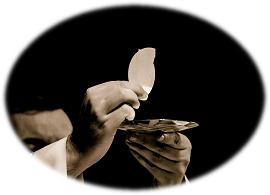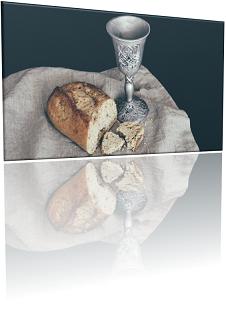Eucharist and Lord’s Supper
Eucharist and Lord’s Supper
Gap. There is an unbridgeable gap between the Roman Catholic doctrine of the Eucharist and the Reformed teaching of the Lord’s Supper. It is either-or. Whoever adheres to the doctrine of the Roman Catholic Church, indeed, cannot participate in the Lord’s Supper of the Reformed church. This applies also the other way around. The teaching of the Eucharist and the doctrine of the Lord’s Supper cannot be joined together. And they cannot both be biblical. One can feel the sharpness of these statements. The commotion that occurred after the Eucharist celebration in the church service on the occasion of the wedding of Prince Maurits and Princess Marilene is to be understood in the light of the different teachings in doctrine.
Eucharist⤒🔗
In the Roman Catholic Church since the year 1215 the doctrine of the so-called transubstantiation is in effect. The word transubstantiation means “change of being.” By means of the words that the priest speaks at the consecration, the miracle of change comes into being. The bread changes into the real body of Christ and the wine into the real blood of Christ. Christ is present in body at the mass celebration. And so he is sacrificed anew. Every time when the Eucharist is celebrated, Christ is sacrificed on the altar by the hands of the priest. This sacrifice is necessary because otherwise the living and the dead could not have forgiveness of sins. For the forgiveness of sins – of the living and the dead (in purgatory) – it is necessary that Christ every time anew be sacrificed on the altar of the church.
 So there is no forgiveness of sins only through the sacrifice that Christ once brought to the cross of Golgotha for his people. The sacrifice on the cross of Golgotha needs the continuation of the sacrifice that is administered in the mass. The sacrifice in the mass is not separate from the sacrifice of Christ on the cross. It is not independent of it, but is coherent with the sacrifice of Christ on the cross. The mass sacrifice has thus become a complete atoning sacrifice. Without this atoning sacrifice, forgiveness of sins is impossible. This mass sacrifice atones also for the dead in purgatory. Their suffering may be shortened by it. Hence the Roman Catholic practice of the soul masses: these are masses that are read for the deceased.
So there is no forgiveness of sins only through the sacrifice that Christ once brought to the cross of Golgotha for his people. The sacrifice on the cross of Golgotha needs the continuation of the sacrifice that is administered in the mass. The sacrifice in the mass is not separate from the sacrifice of Christ on the cross. It is not independent of it, but is coherent with the sacrifice of Christ on the cross. The mass sacrifice has thus become a complete atoning sacrifice. Without this atoning sacrifice, forgiveness of sins is impossible. This mass sacrifice atones also for the dead in purgatory. Their suffering may be shortened by it. Hence the Roman Catholic practice of the soul masses: these are masses that are read for the deceased.
If Christ is physically present in the forms of bread and wine, he also needs to be worshipped in those forms. The holy host is worthy of worship. One can and should kneel down for it. The Council of the Counter-Reformation, the Council of Trent in the 16th century, had expanded and established this Roman Catholic doctrine, and people pronounced a number of anathemas (curses) over those who were adhering to the doctrine of the Lord’s Supper. Thus, the Roman Catholic Church has high expectations of the mass sacrifices. These sacrifices always need to be dedicated anew by the priests to God as application of the sacrifice of Christ on the cross.
This expectation of the mass sacrifices and this practice of the bringing of sacrifices to God by the church have been the reason for, and the setting to the sharp reaction of the Heidelberg Catechism in Lord’s Day 30, question and answer 80. There the Reformed church confesses that the mass is basically nothing but a denial of the only sacrifice and suffering of Jesus Christ, and a cursed idolatry. That is stated sharply, but whoever lets the doctrine and the practice of the Eucharist sink in has to agree that nothing too much has been said here. And we need to remember that the Roman Catholic Church has never reversed its viewpoint of its doctrines and the curses of the Council of Trent. And Rome will not do this either, because then she lets collapse her complete and throughout the ages carefully put together system of doctrine. Whoever is of the opinion that the Heidelberg Catechism has made too strong a statement should remember that here a heresy is condemned. Rome has not hesitated to curse Reformed believers!
Lord’s Supper←⤒🔗
What then is the Lord’s Supper? In many comments about the mass at the royal wedding one could read that bread and wine only have symbolic meaning. The Lord’s Supper would be a meal to remember. But it is not that superficial. The Lord’s Supper is of a much greater wealth! The Lord’s Supper is not a sacrifice. It never can be a sacrifice. For Scripture testifies that Christ can be sacrificed only once. He has sacrificed himself only once and for all, on the cross for reconciliation of sins of all true believers. This sacrifice is not in need of any supplement and/or renewal. The sacrifice finished by Christ on the cross is perfect in all its parts, meeting and in agreement with God’s justice. It has been approved by the Father! It has been accepted by the Father as well.
That is why the Holy Supper has in no way and in no part the character of a sacrifice. Also not of a sacrificial meal. The Lord’s Supper is a meal, a meal of the Lord, but a meal with a very specific character and with a very unique food. Christ gives himself to be eaten and drunk. Also in the Lord’s Supper Christ is present. This presence is reality. Not less “real” than in the Roman Catholic doctrine. But the presence of Christ at the Lord’s Supper is of a spiritual character.
 The living Saviour is present with his Holy Spirit and grace. That is why the Lord’s Supper is first of all the sacrament of communion with Christ. The spiritual presence of Christ is so real that believers are meeting him and receive his communion.
The living Saviour is present with his Holy Spirit and grace. That is why the Lord’s Supper is first of all the sacrament of communion with Christ. The spiritual presence of Christ is so real that believers are meeting him and receive his communion.
This meeting and communion are received and experienced by faith. In Lord’s Days 28 and 29 the Heidelberg Catechism provides the richest instruction about these matters. No less beautiful is Article 35 of the Belgic Confession. In the communion with Christ we accept with a believing heart that he suffered and died for us. And the Holy Spirit, who lives in Christ and in us, unites us evermore with his holy body, even though Christ is in heaven and we are on earth – “flesh of his flesh and bone of his bones, and we forever live and are governed by one Spirit” (Lord’s Day 28, answer 76).The communion with Christ is not first of all the communion as it is experienced by us, but it is having a part of Christ and all his treasures and gifts. Christ establishes the communion and we share in it by faith. Much more can be said about this, but I limit myself to the most essential.
So the Lord’s Supper only can be enjoyed by regenerated people for their comfort. It is because Christ is the content of and the “Host” at the Lord’s Supper. The Lord’s Supper is also for the strengthening of faith, eaten and enjoyed with the mouth of faith and received with a believing heart, true food and true drink: food and drink to life eternal. The Lord’s Supper is the meal of immortality. Eternal life is being distributed and received.
One cannot celebrate the Lord’s Supper superficially, as in just passing by. It demands a concentration on holy things and an opening of the heart by the Holy Spirit. That is why preparing and examining oneself needs to be taken seriously. The self-examination mainly focuses on the question whether we belief. The correct self-examination, about which the Form for the Celebration of the Lord’s Supper so richly speaks, is focused on celebrating the Lord’s Supper with faith! Self-examination leads up to the Lord’s Supper! But then only in the correct way and by the correct means: through faith.
It is indeed impossible for a Reformed believer to participate in the Roman Catholic celebration of the Eucharist. It is also impossible for a Roman Catholic who agrees with the doctrine of the Roman Catholic Church to participate in a Reformed celebration of the Lord’s Supper. Mixed forms are inventions of people, which are meaningless.
If the Roman Catholic Church would really submit itself to the Word of God, to the Lord himself, the sacrificial character of the mass would be abolished. And let Reformed Christians keep understanding and experiencing the richness of the Lord’s Supper.

Add new comment